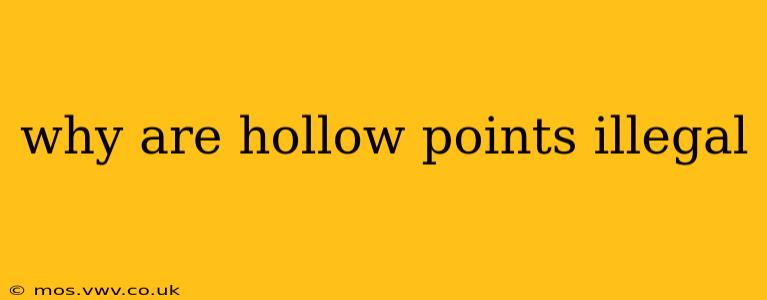Why Are Hollow Points Illegal? The Complexities of Restrictive Laws
The legality of hollow-point ammunition is a surprisingly nuanced issue, varying significantly by location and specific legislation. The simple answer – "hollow points are illegal" – is inaccurate. While some jurisdictions place restrictions on their use, many others allow them without limitation. The confusion arises from the different ways laws address this type of ammunition.
Understanding Hollow-Point Ammunition:
Before delving into the legality, it's crucial to understand what hollow-point bullets are. These are bullets designed with a hollow cavity in the tip. This design causes them to expand upon impact, increasing their stopping power and potentially reducing the risk of over-penetration. This increased stopping power is the core reason why some jurisdictions regulate them.
Why Some Jurisdictions Restrict Hollow Points:
The main arguments behind restricting hollow-point ammunition often center on:
-
Increased lethality: The expanded cavity creates a larger wound channel, potentially leading to more severe injuries or death. This concern is often cited in the context of civilian use, especially regarding self-defense situations where excessive force is a potential legal concern.
-
Overpenetration concerns (in certain contexts): While designed to reduce overpenetration, hollow points can still penetrate certain materials more than other bullet types, depending on the caliber and the material. This raises concerns in densely populated areas where stray bullets could pose a risk. This concern is often more relevant to high-powered rounds.
-
Ethical considerations: Some oppose their use due to their increased lethality, arguing that it's ethically problematic to employ ammunition explicitly designed to inflict greater harm.
Where Are Hollow Points Restricted?
Many countries and regions have different laws, so generalizations are risky. Restrictions are often found in:
-
Specific hunting regulations: Some hunting regulations prohibit hollow points for certain game, either due to concerns about humane killing or because the ammunition type may be deemed too destructive for the game.
-
Self-defense laws: Some jurisdictions may restrict or prohibit hollow point use in self-defense situations, citing concerns about excessive force or the potential for unintended harm to bystanders.
-
Laws restricting certain ammunition types: Some places may have broader bans on certain types of ammunition, which could include hollow points.
Are Hollow Points Illegal for Self-Defense?
This is a key area of confusion. The legality of using hollow-point ammunition for self-defense depends entirely on the jurisdiction. Many places permit them, recognizing their potential to stop threats more quickly and effectively, potentially saving lives. However, others restrict their use in self-defense, often due to the concerns mentioned above. This makes researching your local and state laws crucial if you're considering using them for self-defense.
What About Full Metal Jacket (FMJ) Ammunition?
Often, discussions around hollow point legality arise in comparison to full metal jacket (FMJ) ammunition. FMJ rounds, with their solid metal jackets, tend to penetrate further and may cause less immediate incapacitation. While generally not as restricted as hollow points, some places also regulate FMJ ammunition.
Conclusion:
The legality of hollow-point ammunition is not a simple yes or no answer. The answer depends heavily on specific local, state, and national laws, intended use (hunting, self-defense, target shooting), and the specific type of ammunition. Always check the relevant regulations in your area before purchasing or using this type of ammunition. Ignorance of the law is no excuse for its violation. Consult with legal experts and law enforcement agencies for definitive answers regarding your jurisdiction's laws.
